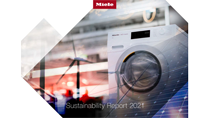Press releases
New study on energy saving in households reveals zigzagging by consumers

-
Over 80% basically want to save more energy
-
For three out of four persons polled, energy costs are the decisive incentive
-
Over 60% pay 'very great' attention to sustainable criteria during purchasing
-
But it often stops post-purchase: Potential savings often remain untapped
The energy and climate crisis has sensitised consumers in Germany. The Hamburg-based market researchers Appinio, commissioned by Miele, revealed that consumers want to place greater store by sustainable criteria when purchasing food, domestic appliances and clothing. But that is where it ends for most people: Consumers leave the huge potential for both the environment and the wallet which comes from the regular use of Eco programmes untapped. Whereby the latter is a clear incentive for sparing use. The survey polled 500 representatively selected men and women each (around mid-July).
82% of those polled between the ages of 18 and 65 stated that they have paid more attention to energy consumption since the onset of the energy crisis. Electricity savings, too, is a high priority for 86%. Three out of four consumers even say they try to live as climate-friendly as possible. Obviously, there is a big gap between claims and reality. 61% maintain, for instance, that they pay great attention to sustainability criteria when purchasing products.
But, after that, many people do not even put the simplest of measures into practice – for instance the Eco programme on domestic appliances. Only around 15% stated that they mainly use this programme on a washing machine, and no fewer than 30% on dishwashers. But only every tenth user selects the Eco mode most frequently on washing machine und dishwashers alike. This is despite the fact that Germany's consumer watchdog Stiftung Warentest rated Eco programmes highly in virtually all cases in their current dishwasher test (July 2023) magazine edition. And: Consistent use of the Eco programme saves up to € 335 in operating costs over 10 years.
'When it comes to sustainability, consumers in Germany apparently zigzag around: They want to save energy but are in two minds when it comes to putting their intentions into practice. Unfortunately, in doing so they allow great potential to go to waste. We support them in leveraging their energy-saving potential to the greatest possible degree', says Rebecca Steinhage, Miele Executive Board Member, responsible inter alia for personnel and sustainability.
Saving resources also a question of age
92% of those polled between 55 and 65, the so-called baby-boomers, claim to make above-average efforts to save more energy since the beginning of the energy crisis. By comparison, the figure for those polled between 18 and 34 was just less than 68%. As far as the claim goes that the energy and climate crisis have an impact on behaviour, the agreement rate among those born after 1990 was lower than in the population at large. On the other hand, baby-boomers often do not pre-heat their oven, use its residual heat and switch technical devices off completely instead of leaving them in stand-by mode.
Of myths and habits
And, still: Washing laundry across the board at 40°C or 60°C, cleaning crockery under running water before putting it into the dishwasher, and pre-heating ovens – that is all common practice in many German households. Possible reasons for this are die-hard habits or 'myths' engrained in the minds of many. 41% of those polled, for example, who claim that energy saving is 'not that important' believe that the use of Eco programmes is superfluous on appliances with an A rating on the EU energy efficiency label as they already use little energy. Only 17% of the same cohort do not have any idea how to save energy in their household.
Customers demand cost transparency
The survey also reveals that consumers in Germany are not only interested in the consumption and CO2 emissions of their electrical devices but also in saving hard-earned cash. Around 48% of those surveyed would be motivated if their appliances – with or without connected apps – were to show how much money they save with energy-efficient programmes. The study also shows that most of those polled value their wallet more than the climate: 78% still want to reduce their outgoings; only 22% responded that protecting the climate is at the centre of their efforts.
Consumption Dashboard helps save energy and water
Enter the Consumption Dashboard: The consumption monitor, part of the Miele app, visualises how often consumers use the various programmes on their washing machine or dishwasher – and how much water and electricity they use in each programme. Tips on the more efficient use of appliances are also included. Shortly, all this will work not only from a tablet or smartphone but also using voice control, for example via Amazon Alexa. At the world's largest trade show for electronics and domestic appliances, the IFA, Miele is presenting an update of the Consumption Dashboard with additional functions, for example a personalised monthly report.
'Just use Eco' house: Interactive info point at the IFA
In an additional booth in the new Sustainability Village (Building 2.2), Miele is highlighting various savings around the home. In the 'Just use Eco' house, visitors learn how to avoid wasting electricity and water without expending great effort – with positive effects on consumption (kWh saved), the environment (carbon dioxide saved) and money. Responsibility for the info booth lies in the hands of Christoph Wendker, Vice President Sustainability and Regulatory Affairs at Miele. 'What we demonstrate is that saving energy in the home, be it for cost or climate protection reasons, is simpler than many presume', says Wendker. This, too, contributes towards closing the gap between claims and reality.
Company profile: Miele is the world's leading manufacturer of premium domestic appliances including cooking, baking and steam-cooking appliances, refrigeration products, coffee makers, dishwashers and laundry and floor care products. Their product portfolio also includes dishwashers, washing machines and tumble dryers for commercial use as well as washer-disinfectors and sterilisers for use in medical and laboratory applications. Founded in 1899, the company has eight production plants in Germany, one each in Austria, the Czech Republic, China, Romania and Poland as well as two production plants belonging to its Italian medical technology subsidiary Steelco. Sales in the 2022 business year amounted to around € 5.43 bn. Miele is represented with its own sales subsidiaries and via importers in almost 100 countries/regions. Throughout the world, the family-run enterprise, now in its fourth generation, employs a workforce of around 23,300, of which approx. 11,900 employees work in Germany. The company has its headquarters in Gütersloh in Westphalia.
Dirk Haushalter
+49 5241 89-1027
dirk.haushalter@miele.com
Media information
| Description | Download |
|---|---|

Photo 1: The "Just use Eco" house is an interactive information stand from Miele that demonstrates savings potential, for example, by using the Eco program on washing machines and dishwashers – with a positive effect on consumption, the climate and the wallet. |
|
High Resolution JPG |
|

Photo 2: It stops after the purchase. A Miele survey shows that energy-saving potential in household appliances is still too often left untapped. (Graphic: Miele) |
|
High Resolution JPG |
|

Photo 3: The Consumption Dashboard, part of the Miele app, shows customers the water and electricity consumption of their washing machine or dishwasher. Miele presents the new monthly report for the first time at IFA 2023. (Photo: Miele) |
|
High Resolution JPG |
|

Photo 4: The Consumption Dashboard, part of the Miele app, shows customers the water and electricity consumption of their washing machine or dishwasher. Miele presents the new monthly report for the first time at IFA 2023 (Photo: Miele)
|
|
High Resolution JPG |


